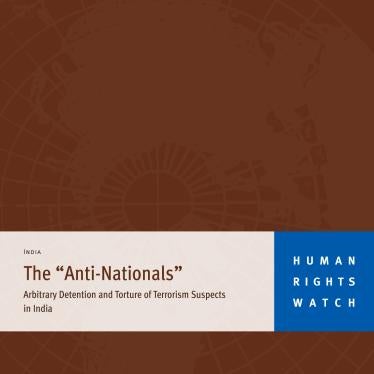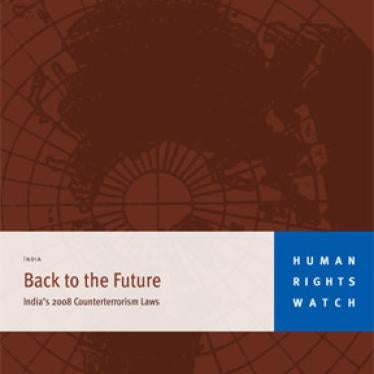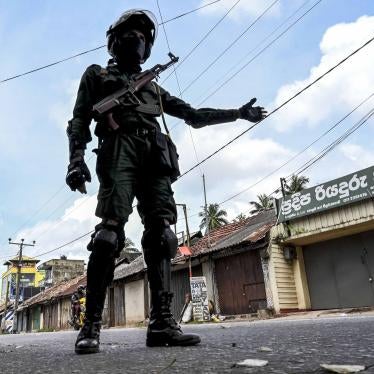(New Delhi) - The Indian government should reform its justice system to ensure that abuses do not take place during counterterrorism efforts, Human Rights Watch said in a report released today. While Indian authorities have taken recent steps to prevent wrongful accusations of terrorism, the government should also investigate the many allegations of torture and coerced confessions of terrorism suspects and hold those responsible to account.
The 106-page report, "The ‘Anti-Nationals': Arbitrary Detention and Torture of Terrorism Suspects in India," documents consistent abuse by Indian security forces in their response to the scourge of terrorism attacks. State police, jail officials, and other authorities have committed a range of human rights violations, including arbitrary arrest and detention, torture, and religious discrimination. The report details the mistreatment of alleged members of the Indian Mujahideen, a militant Islamist group that since 2008 has claimed responsibility for six bombings and other deadly attacks, as well as that of Hindu nationalist suspects charged in a separate bombing in 2008.
"Indian police are under tremendous pressure to identify the perpetrators of horrific attacks, but they need to do so without resorting to the use of arbitrary arrests and torture to coerce confessions," said Meenakshi Ganguly, South Asia director at Human Rights Watch. "Not only do such unlawful responses alienate local populations, they risk allowing the real perpetrators to remain free and pose an ongoing threat to public safety."
"The ‘Anti-Nationals'" focuses on the aftermath of three deadly bombings of major Indian cities in 2008 for which the Indian Mujahideen claimed responsibility. At least 152 people died and hundreds of others were injured in the synchronized bombings of markets, hospitals, and other public places in Jaipur on May 13, Ahmedabad on July 26, and New Delhi on September 13 of that year. The report is based on more than 160 interviews with suspects, their relatives and lawyers, civil society activists, security experts, and law enforcement officials in New Delhi, as well as in the states of Gujarat, Maharashtra, Rajasthan, and Uttar Pradesh.
In sweeps across the country, state police, usually Anti-Terrorism Squads, brought in scores of Muslim men for questioning and promptly labeled many "anti-national" - implying they were unpatriotic. The police ultimately charged more than 70 alleged Indian Mujahideen members or associates from nine states in the 2008 attacks and in a related attempted attack on the port city of Surat in July 2008. All were held without bail.
In some states, police held suspects for days or even weeks without registering their arrest, in an apparent effort to get them to confess. Police in Gujarat and Delhi also manipulated criminal procedures to allow them to hold suspects for interrogation well beyond the initial 15-day legal limit after arrest. Many detainees have alleged they were the victims of torture, including the use of electric shocks. A released suspect held in a lockup of the Ahmedabad Crime Branch of the Gujarat state police, where some of the worst abuses occurred, said that detainees were kept blindfolded and shackled with their arms crossed over their knees. Detainees or their relatives also said they were beaten, and threatened with arrest and mistreatment of family members if they did not cooperate.
Several suspects alleged that police made them sign blank sheets of paper that they feared were used for confessions or woke them up at night to make them repeat a police version of events. Many suspects also were denied access to lawyers for days or weeks after their arrest, in violation of Indian and international law. Upon finally meeting with counsel, the suspects often were not allowed to speak with lawyers out of earshot of guards. Some lawyers defending Muslim terrorism suspects were threatened or physically attacked by Hindu extremists, many of them fellow lawyers, who labeled them unpatriotic.
The report also includes credible allegations that some of the 11 Hindus arrested for a separate 2008 bombing incident in the city of Malegaon, Maharashtra state, were also subjected to arbitrary detention, torture, and religion-based ill-treatment. One Hindu suspect, a self-styled theologian, alleged that during one torture session, police forced what they said was beef, which is forbidden to Hindus, down his throat.
While the worst abuses occurred after arrest in police custody, Human Rights Watch also found that dozens of suspects were also beaten in 2009 after being transferred to jails in Ahmedabad and Jaipur. They also faced indifference or bias in court proceedings if they complained of mistreatment.
"Abuses of suspects detained in connection with the 2008 bombings occurred at every stage of custody, from police lock-ups where many were tortured, to jails where they were beaten, to courthouses where magistrates often ignored their complaints," said Ganguly. "This is what we would expect from China. The world's largest democracy can do better."
In addition, Human Rights Watch also called on the Indian authorities to immediately launch a thorough and impartial investigation into the case of nine Muslim men held as suspects for more than four years and allegedly tortured in connection with deadly bombings in 2006 at a Muslim cemetery in Malegaon. Investigations in late 2010 and early 2011 revealed that Hindu extremists are now the lead suspects in that attack and other major bombings in 2006-07 in India previously attributed to Islamist militant groups. The attacks at mosques in Hyderabad and Amjer, on a passenger train linking Pakistan to India, and at the cemetery in Malegaon killed at least 115 people and injured nearly 350 others.
The National Human Rights Commission, the Indian government body that is officially mandated to investigate allegations of human rights violations, has responded tepidly to complaints involving terrorism suspects, Human Rights Watch said. Most glaring was its investigation into the so-called Batla House encounter, a police raid after the Delhi bombings of September 2008 in which two Indian Mujahideen suspects died in circumstances that aroused suspicion. Ordered by the Delhi High Court to probe the two suspects' deaths after ignoring its own guidelines that require all killings to be investigated, the Commission produced a report that exonerated police while relying almost exclusively on the police version of events. A new and more serious inquiry into the causes of death is needed, Human Rights Watch said.
"The National Human Rights Commission has lost its voice when it comes to counterterrorism abuses," said Ganguly.
The spate of 2008 bombings was overshadowed by the November 26, 2008 attack on the entertainment and commercial hub of Mumbai. In response, India's parliament in December 2008 passed amendments likely to result in abuse of terrorism suspects and the infringement of basic due process rights. Amendments to the Unlawful Activities (Prevention) Act (UAPA) contain sweeping, vaguely worded definitions of terrorism, vastly increase police powers of search and arrest, and double the maximum period of pre-charge detention for terrorism suspects to 180 days, well beyond internationally accepted limits. The amendments mirror provisions of the notorious Prevention of Terrorism Act (POTA), a law the ruling Congress Party repealed in 2004 because it encouraged abuses.
However, Human Rights Watch said that the authorities have shown welcome restraint in responding to three more recent attacks in 2010 that they attributed to the Indian Mujahideen. These include a bombing in the city of Pune in February that killed 17 people at a restaurant frequented by foreigners; a motorcycle drive-by shooting in New Delhi in September that injured two Taiwanese tourists; and a bombing in December in Varanasi, Hinduism's holiest city and a popular tourist site, that killed a one-year-old child and woman in her sixties.
"While the authorities' recent responses to attacks are encouraging, if India is to achieve long-term success in countering militant violence, it will need to transform individual acts of restraint and respect for the law into institutional changes," Ganguly said. "That includes the police putting an end to the ugly assumption, all too common after the 2008 bombings, that only Muslim groups were likely suspects in the attacks."
Human Rights Watch sets out detailed recommendations for reform to the Indian government, state governments, and state police.
They include:
- Repeal unlawful provisions of counterterrorism laws, including overly broad definitions of terrorism, expanded police powers of search and seizure, the presumption of guilt under certain circumstances, and draconian pre-charge detention periods.
- Enact the pending Prevention of Torture Bill, but only after ensuring it conforms with the Convention against Torture and Other Cruel, Inhuman or Degrading Treatment or Punishment.
- Sign into law criminal procedure amendments, already passed by parliament, requiring the police to record a formal reason for making a warrantless arrest - thereby closing a glaring legal loophole that fuels impunity.
- Professionalize India's police forces and codify the full set of guidelines on arrest and detention for police officers that are contained in the landmark 1997 Supreme Court case D.K. Basu.
- Fully investigate allegations of wrongdoing by police and other officials, including the accusations of alleged Indian Mujahideen suspects and Muslims previously rounded up in attacks now blamed on Hindu extremists, to end the culture of impunity for crimes against terrorism suspects and others in India.
Selected Accounts From "The ‘Anti-Nationals'"
"The policeman said to me, ‘Please speak to your son. Tell him that he must give us a few names. Then we will let him go.' But my son told me, ‘I cannot give any names wrongfully.' The police said to me, ‘Your son's life will be ruined. Tell him to identify some people.' "
- A father whose son was detained for the 2008 Ahmedabad bombings, July 2009
"We were made to wear dark masks. I had to stand with my hands extended horizontally and if they came down, the police would beat me. Whenever they interrogated me and they felt that the answer was improper, they beat me with the wooden stick or the leather belt or whatever they liked.... I was told by the police department, ‘If you do not cooperate, we will take custody of all of your family....' I was so scared I did not know what would happen and what to do or not to do. I had no hope of coming out."
- An Indian Mujahideen suspect describing his 2008 detention in an Ahmedabad Crime Branch police lockup
"The police said that they would release Shakeel only when Raziq comes. But ... he had left his wife with our relatives and disappeared."
- A mother whose son was unlawfully detained for a month in 2008 while police sought his brother
"The very first question was: ‘Why have you people become anti-national? You people are bloody Pakistanis.' They kept on targeting my religion, actually my beliefs, my practices."
- A young Muslim professional on his interrogation in 2008 by the Delhi Special Cell police
"When I asked my son if he was tortured, he said, ‘They are hardly going to treat me with love. They want to build the case....They used to make us memorize a story of the police version of the case. We were not allowed to sleep until we could recite the police version.' "
- Nisar Ahmed, whose son Saqib Nisar has been charged for his role in the 2008 bombings








